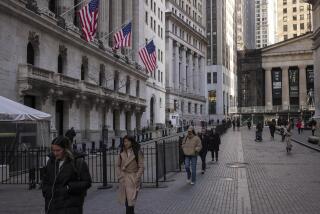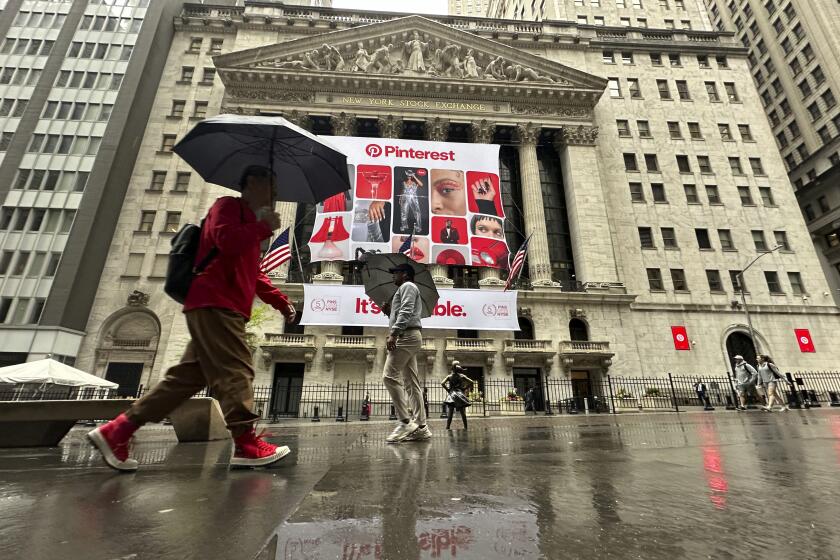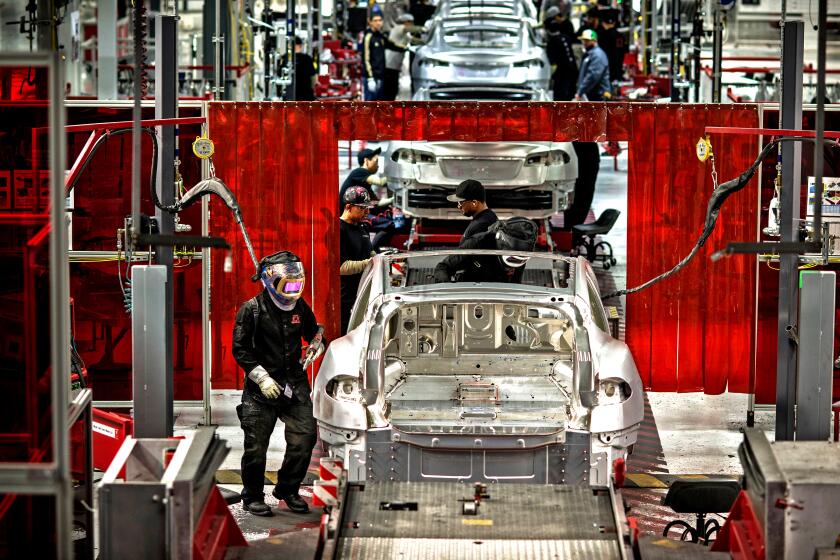Any Value for Investors in Name Change?
Maybe this sounds familiar: A company decides to change its name to better reflect its new corporate focus or simply to give itself a snappier, more modern moniker that more investors will notice.
Time to buy the stock--or sell?
Investors who have stuck with such renamed stocks as Venator Group, Diageo and Aspeon in recent years can testify that a New-Age-sounding moniker doesn’t necessarily translate into New-Age capital gains.
In fact, it’s often just the opposite.
Fueled by mergers and the rush to join the “new economy,” name changes by U.S. public and major privately held companies rose from 1,153 in 1995 to a record 2,733 in 1999, according to New York-based consulting firm Enterprise IG.
In the first half of this year, the total number of domestic name changes hit 1,478.
Branding and corporate-image consultants say no reliable studies have measured whether name changes have an effect--positive or negative--on companies’ stock market performance in aggregate.
But our unscientific study, which includes some of the best-known name changes of recent years, isn’t encouraging. For every Nortel Networks (ticker symbol: NT), whose shares have nearly quadrupled since the firm changed its name from the “old-economy”-sounding Northern Telecom in April 1999, there appear to be many companies that make a switch only to see their stocks greeted with a market shrug--or worse.
Shareholders of Verizon Communications (VZ), formed in early July when Bell Atlantic combined with GTE, must know the feeling: The stock has slumped about 20% since the name change, measured from the closing price the day the change took effect.
Of course, you can’t blame a name change itself for a stock’s poor performance. But a change could signal big ambitions that a company may not be able to live up to. Or it could just be a relative waste of shareholders’ money for new signage and stationery.
The former Javelin Systems of Irvine became Aspeon (ASPE) early this year. The firm, which develops touch-screen, point-of-sale computers for fast-food companies and retailers, said the name change reflects, in part, its focus on “application service provider [or ASP] solutions.”
But the new Aspeon has been a disappointment on Wall Street. The stock has slumped from $13 in January to less than $3 now--though it soared for a time in spring, with the general tech stock mania.
Corporate image specialists note that a new business plan and other factors often come into play in tandem with a name change, which is one reason the effects of name changes alone in attracting investors are hard to measure.
The rationale behind many name changes is the idea of helping investors and potential investors better comprehend what a company does.
Hence, Premier Parks in July became Six Flags (PKS), the principal amusement-park brand of the company.
“Branding is what makes people understand what you do, feel like they know you and want to invest in your company,” said Jeff DeJoseph, chief strategic officer of New York ad agency Doremus.
Still, he acknowledged, “It’s very tough to tie an intangible like identity to equity value.”
In a recent survey of individual investors commissioned by the agency, Corning (GLW) was identified as the maker of Corningware by 70% of the respondents--even though the consumer products division was sold two years ago. Just 10% correctly identified the company as a fiber-optics business.
Yet that hasn’t stopped the stock from quintupling in the last 12 months. Tech investors obviously know what the company is all about.
Many companies, of course, feel they’re forced into name changes by a merger. When two entities combine, they have three options: pick one or the other’s name, combine the two names or try something completely different.
Thus, US West went away when it merged with Qwest Communications (Q) and NationsBank went away when it bought Bank of America (BAC), which NationsBank felt had a better-known brand name.
“A simple, strong brand name helps your valuation. If there’s awareness and familiarity, you get the benefit of the doubt,” said Ron Cappello, president of Enterprise IG (which was known as Anspach Grossman Portugal for many years before changing its name).
Companies such as DaimlerChrysler (DCX), formed by the Daimler Benz-Chrysler merger, and Citigroup (C), formed by the Citicorp-Travelers Group merger, opted for the combo route, which consultants say can sometimes be confusing.
“In the mutual fund industry, since Twentieth Century acquired Benham and changed the name of the whole thing to American Century they’ve grown like gangbusters,” said Ira Bachrach, president of NameLab, a San Francisco-based branding agency.
“But since Franklin and Templeton merged to form Franklin Templeton it has grown less dramatically,” Bachrach said. “It stands for two things--one very conservative [Franklin], one international equities [Templeton]. That can be a little hard to understand, though there may be other reasons for the disparity.”
Verizon--a combination of veritas, the Latin word for truth, and horizon--exemplifies option No. 3.
“In these deals companies may be lighting a match to millions, even billions, of dollars in goodwill [in their old names],” Bachrach noted, which is one reason new names are often accompanied by ad blitzes. “You have to create a new identity as quickly as possible.”
Companies can pay big money for a made-up name--such as Verizon, which “connotes certainty and reliability along with the possibilities ahead,” a spokesman says--for good reasons. A firm may want a name that gives it a global flavor and an elasticity to move the business in almost any direction. A name that is an unencumbered URL address for the Internet also has appeal.
But some companies that have chosen made-up names have been remembered as huge bombs.
In a widely criticized move in the late 1980s, a diversifying United Airlines changed its name to Allegis Corp. The business strategy failed, and so did the name, which some analysts said sounded like a disease.
One popular strategy has been to pick a vague but classy-sounding word and add “Group” to it. Thus, in recent years Woolworth became Venator Group (Z), Saratoga Brands became Classica Group (TCGI) and Baltimore Gas & Electric became--talk about expanding your horizons--Constellation Energy Group (CEG).
But the more obtuse the name, our unscientific survey suggests, the more skeptical investors should be about the stock’s potential.
Diageo, formed by the merger of Britain’s Guinness and Grand Metropolitan, is “smooth and sophisticated, with its flowing vowels. But it’s not an ideal name for a packaged goods company. It sounds artificial,” Bachrach said. “It would be perfect for a luxury goods company, however.”
One of Bachrach’s favorite recently reworked names is MarchFirst (MRCH), a technology services and consulting firm formed by the March merger of Whittman-Hart and USWeb/CKS.
“It’s obtuse, but it’s aimed at people like me,” he said. “The audience is Internet professionals--propeller heads.”
But shareholders are still waiting for a payoff: Since March 23, when the name change took effect, the company’s stock has fallen by more than half.
*
Josh Friedman can be reached at josh.friedman@latimes.com.
(BEGIN TEXT OF INFOBOX / INFOGRAPHIC)
Corporate Name Changes: And Then What Happens?
Experts say no reliable research has demonstratedwhether corporate name changes on average have ameaningful impact--positive or negative--on stock marketperformance. But our random, just-for-fun sampling of15 public companies that have changed their names inrecent years shows that subsequent stock performancehas been mostly dismal relative to the Standard &Poor;’s 500 index.
*--*
Pctg. point Date difference in Ticker of name stock return Old name New name symbol change vs. S&P; 500* American Brands Fortune Brands FO 6/2/97 -93.0 pts. * Comment: Conglomerate snuffed out ties to tobacco Guinness Diageo DEO 12/17/97 -62.5 * Comment: Maybe a great name for a luxury car, but... Woolworth Venator Group Z 6/12/98 -61.4 * Comment: Vena-what? Northern Telecom Nortel Networks NT 4/30/99 +287.4 * Comment: Shed that Canadian image, eh? Circus Circus Mandalay Resort MBG 6/21/99 -1.4 Group * Comment: More highfalutin, a lot less redundant VDI Media VDI Multimedia VDIM 8/24/99 -62.0 * Comment: More media, but investors apparently unimpressed Western Ctry Atomic Burrito ATOM 9/7/99 -70.2 Clubs * Comment: Nothing subtle about this shift in connotation CustomTracks ZixIt ZIXI 10/1/99 +7.0 * Comment: SavesSpaceOnStationery Foodmaker Jack In the Box JBX 10/4/99 -23.0 * Comment: Bingo--it’s all about the brand Cincinnati Bell Broadwing BRW 11/15/99 -17.2 * Comment: Scoffing at those regional boundaries Maxim Group Flooring America N/A** 1/3/00 Delisted * Comment: Action verb, patriotic ring, but it didn’t help Javelin Systems Aspeon ASPE 1/31/00 -83.8 * Comment: Still sounds Greek--but less Ancient Greek InfoSpace.com InfoSpace INSP 4/7/00 -50.1 * Comment: Who you callin’ a “dot-com,” pal? Bell Atlantic Verizon VZ 7/3/00 -19.8 Communications * Comment: OK, but enough with those commercials already Premier Parks Six Flags PKS 7/3/00 -34.0 * Comment: See Jack In the Box
*--*
* Through Friday, measured as percentage point difference by which the individual stock’s return lagged or beat the S&P; return, from closing price the day change took effect
** N/A: Not applicable
Sources: Times research, Bloomberg News






